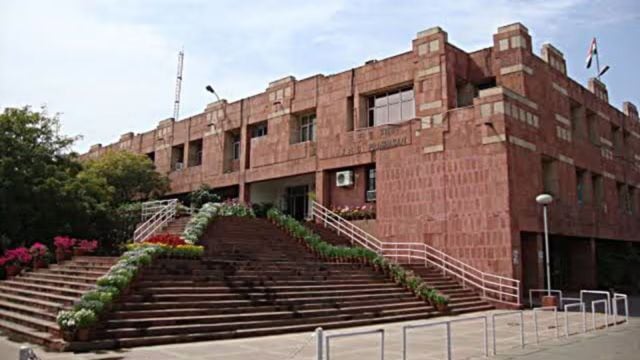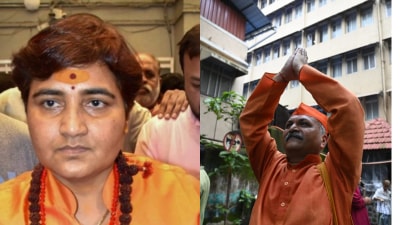JNU faces Rs 2-crore deficit, panel seeks ‘rationalisation’ of aid for poor students
Between 2021–22 and 2022–23 alone, disbursal shot up from Rs 2.13 crore to Rs 3.99 crore. In 2024-2025 (till October 31, 2024), the amount stood at Rs 2,96,89,560.
 As per the committee, the university’s total fee receipts for the 2023–24 academic year (monsoon and winter semesters) stood at Rs 1,61,24,885. In contrast, disbursal under the MCM scholarship for the same period was Rs 3,65,03,199 — leaving a financial deficit of over Rs 2 crore.
As per the committee, the university’s total fee receipts for the 2023–24 academic year (monsoon and winter semesters) stood at Rs 1,61,24,885. In contrast, disbursal under the MCM scholarship for the same period was Rs 3,65,03,199 — leaving a financial deficit of over Rs 2 crore.Facing a widening gap between revenue and expenditure, Jawaharlal Nehru University (JNU) has recorded a deficit of over Rs 2 crore — a shortfall that an internal committee attributes largely to the payouts under its Merit-cum-Means (MCM) scholarship scheme for students from economically disadvantaged backgrounds, The Indian Express has learnt. The committee called for “due rationalisation” of the system of awarding the scholarship.
As per the committee, the university’s total fee receipts for the 2023–24 academic year (monsoon and winter semesters) stood at Rs 1,61,24,885. In contrast, disbursal under the MCM scholarship for the same period was Rs 3,65,03,199 — leaving a financial deficit of over Rs 2 crore. “The Committee felt that… the university is not left with a sufficient amount for day-to-day maintenance, repair, and renovation works of buildings. Therefore, the Committee felt that the system of award of MCM and consequent disbursement calls for due rationalisation,” it stated.
Officials at the university did not respond to queries from The Indian Express on whether the proposed rationalisation will affect new or ongoing scholarships.
Records show that the annual amount spent on the MCM scholarships has grown dramatically — from Rs 13.3 lakh in 1994–95 to over Rs 3.66 crore in 2023–24. Between 2021–22 and 2022–23 alone, disbursal shot up from Rs 2.13 crore to Rs 3.99 crore. In 2024-2025 (till October 31, 2024), the amount stood at Rs 2,96,89,560.
A key eligibility criterion for the scholarship is that the total annual income of the applicant’s parents or guardians from all sources must not exceed Rs 2,50,000 per annum. This income cap is intended to ensure that the scholarship benefits students from economically disadvantaged backgrounds.
The MCM is funded through the university’s “internal receipts”, a pool that includes tuition fees, recovery of electricity and water charges from employees, shop rents, medical charges, and income from guest houses. “The committee was further apprised that there is an increasing financial burden on ‘internal receipts’ due to payment of MCM when viewed against the amount of tuition fees received from students…,” the panel stated.
Specifically, the receipts comprise rent from Gomti Guest House, Aravali Guest House, and Aravali International Guest House, as well as fees collected at the health centre and income from miscellaneous sources such as the sale of waste paper, conservancy charges, staff quarter licence fees, and recruitment application fees, amongst many others.
But the committee noted that this revenue pool is under strain, especially with maintenance and infrastructure needs rising. “Because of this, the university is not left with sufficient funds,” the committee concludes.
The MCM scholarship application form on JNU’s website states that only students enrolled in certain Bachelor’s and Master’s programmes are eligible to apply.
A student is required to submit an undertaking affirming that they are not currently receiving any other fellowship, state scholarship, or form of remuneration. They must also declare their present employment status — whether employed or not in any government or private organisation.
Furthermore, the student commits to informing the Dean or Chairperson immediately if they secure any form of employment, fellowship, honorarium, or remuneration in the future. The undertaking explicitly states that furnishing false information may lead to disciplinary action by the Centre or School, including the cancellation of admission if any misrepresentation is later discovered.
In 2018, the JNU Students’ Union (JNUSU) alleged the administration had not released the scholarships to BA-MA students for over eight months, withholding over Rs 50 lakh and causing financial hardship for many students struggling to meet educational and daily expenses.
In 2019, official data showed that around 18% of JNU’s student population availed of the scholarship, underscoring its significance as a key financial support mechanism for those from economically disadvantaged backgrounds.
Since the post-pandemic resumption of JNUSU election, increasing the amount disbursed under the MCM scholarship has remained a key electoral promise made by every presidential candidate, making it a persistent campus issue for students.












